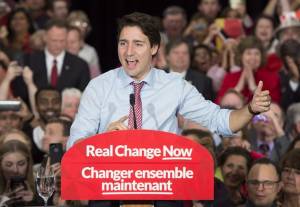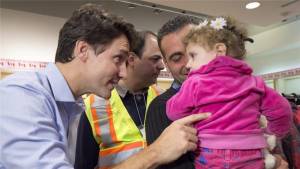Canadian Prime Minister Justin Trudeau issued a statement on International Holocaust Remembrance Day that included no mention whatsoever of the six million Jewish victims.
United Nations Resolution 60/7, at the initiative of the State of Israel, in 2005 established January 27 as International Holocaust Remembrance Day. That day was specifically chosen because it marks the anniversary of the liberation of the infamous Auschwitz-Birkenau extermination camp by the Soviet Union in 1945.
Jews were the primary victims of Nazi genocide. An estimated 11 million people were murdered – including, for example, gypsies, homosexuals, physically and mentally disabled people and the non-Jewish Polish intelligentsia. Among them were six million Jews.
As explained in the Holocaust Encyclopedia, “The Holocaust was the systematic, bureaucratic, state-sponsored persecution and murder of six million Jews by the Nazi regime and its collaborators.”
Following is the statement made Wednesday by Canadian Prime Minister Justin Trudeau on the occasion of International Holocaust Remembrance Day:
“On this day, we pay tribute to the memory of the millions of victims murdered during the Holocaust. We honor those who survived atrocities at the hands of the Nazi regime, and welcome their courageous stories of hope and perseverance.

Canadian PM Justin Trudeau waves to supporters in Ottawa ahead his landslide victory in the October election. (The Canadian Press via AP)
“The Holocaust is a stark reminder of the dangers and risks of allowing hate, prejudice, and discrimination to spread unchallenged. It also reminds us that silence must never be an option when humanity is threatened.
“As we pause to educate ourselves and our families on the bitter lessons of the Holocaust, we also strengthen our resolve to work with domestic and international partners to continue defending human rights and condemning intolerance.”
The Launch of a New Era?
Since winning the Canadian national election in October, the Trudeau government has been following up on its commitment to establishing a more “balanced” approach to the Arab-Israeli conflict, as opposed to the Harper government’s strong stand with Israel and opposition to moral relativism. Some political observers believe that the appointment of Omar Alghabri, a former president of the Canadian Arab Federation (CAF), as parliamentary secretary to the minister of foreign affairs is strongly indicative of a meaningful change in direction. The previous Canadian leadership had banned CAF from receiving government funding, citing its support of terrorism and anti-Semitism.

Prime Minister Justin Trudeau greets refugees fleeing Syria, during their arrival at Pearson International airport, Toronto [AP]
A United States Homeland Security meeting – titled “Canada’s Fast-Track Refugee Plan: Unanswered Questions and Implications for US National Security” – is scheduled for next week in light of Trudeau’s promise to bring 25,000 Syrian refugees to Canada within the next couple of months. The Canadian leader has already made headlines with his highly publicized welcome to the first planeload at the Toronto airport in December.
In 2012, Harper broke off all diplomatic relations with Tehran. On Wednesday, Canadian Foreign Minister Stephane Dion, arguing that Canada could become isolated from its allies if it maintained sanctions against Iran, said: “In which way [is it] helping Canada or the Iranian people or Israel or anyone that Canada is hurting its own industry?”
By: Terri Nir, United with Israel